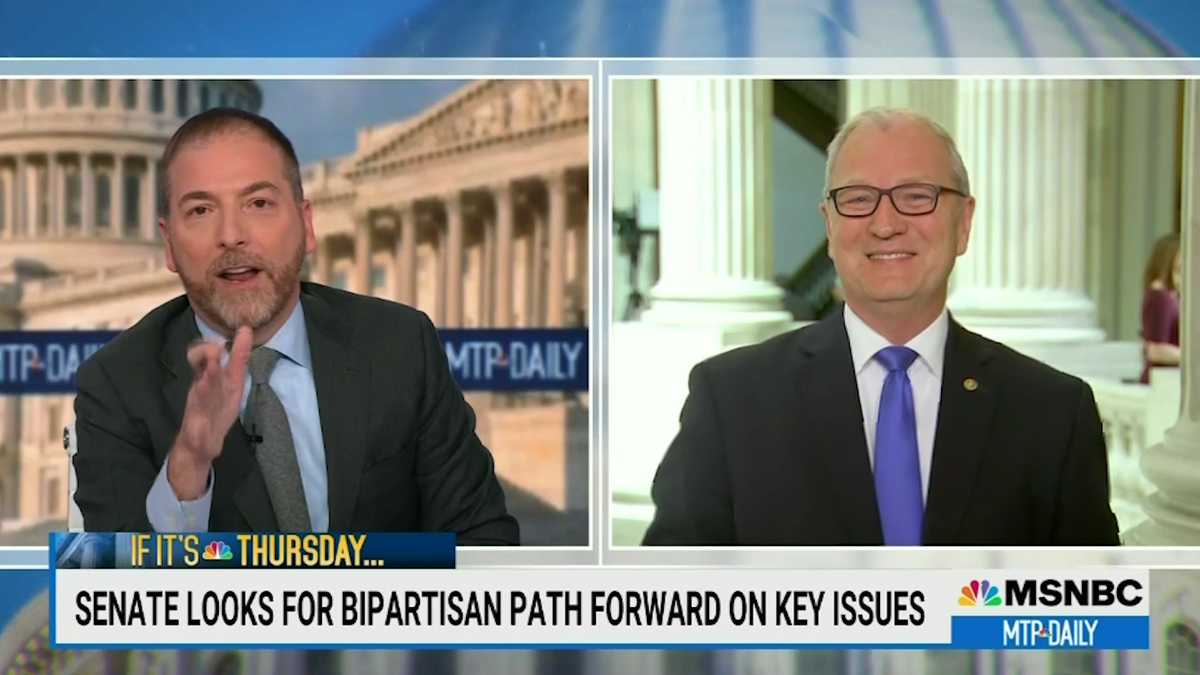Source: United States Senator Kevin Cramer (R-ND)
***Click here to download video. Click here for audio.***
WASHINGTON – U.S. Senator Kevin Cramer (R-ND), member of the Senate Environment and Public Works Committee, joined Chuck Todd on Meet The Press Daily to discuss Ukrainian aid, Senate energy and climate negotiations, and immigration reform. Excerpts and the full video are below.
On Ukrainian Aid:
“If we could bifurcate all of them and have a straight up-or-down votes, we’d certainly pass Ukrainian aid… I think [passing Ukrainian aid if it’s linked with COVID aid] becomes more difficult. It becomes more political and Ukrainian aid so far has been bipartisan. I’d prefer it remains [bipartisan].”
On Senate Energy and Climate Negotiations:
“You do have to start thinking about the negotiation – what price is one side willing to pay to the other [side] to get what they need and what they want? What I think is realistic is if we have some fuel-neutral things for example. If we’re going to the tax code and start talking about credits, let’s focus on emissions, not on the fuel choice, because the fuel choice becomes part of the politics. The other thing that’s really important, but we don’t acknowledge often enough is if all we did – and I’m not suggesting this should be the package – was replace Venezuelan oil with American oil or Vladimir Putin’s natural gas with liquefied natural gas (LNG) from the United States, we’d already be bringing down greenhouse gas emissions. It could be considered climate [change]. That said, I know that’s not enough for Democrats.
“I think we put everything on the table. You can’t have a discussion with nonstarters. So, let’s put everything on the table and work through it. We have to start helping investment in things like carbon capture. The LNG piece is the really big piece. I think is the urgent piece where there are a number of projects just waiting to be approved. The problem with a lot of this is that it’s capital intensive, and you can’t deal with a crisis at the moment and not give the investor some long-term certainty. We need to have longer term plans to coincide with these longer term investments.”
On Immigration Reform:
“[The United States] has a pretty decent asylum policy if we actually enact it. But we have a really big short- and long-term workforce shortage and that ranges from part-time low-skilled to the various high-skilled workers. We need a skills-based immigration policy and asylum can fit right into that. Right now, if you’re an asylum seeker and you get into the United States and you wait for the processing, you don’t get to work. We have people who need workers and we have asylum seekers who need income. I think that’s a reasonable discussion reasonable people on both sides of the aisle could have.”
“Just like we have this window opening in Europe that presents this grand opportunity for significant climate and energy policy, we have a workforce crisis that opens up the door for a more significant immigration policy discussion, particularly around skills-based [immigration]. I’ve introduced H1-B reforms and have taken blows to the head from people who would otherwise understand but don’t because it’s got the word immigration attached to it. That’s why people need to step up and explain ourselves. You have to be willing to go out and sell [immigration reform]. I can sell it in North Dakota, but everyone needs to sell it where they live.”
“There are enough specific examples, whether it’s physicians or specialists in medicine, engineers, or laborers in factories or fields. There’s a growing demand and a growing understanding of that demand. Inflation itself is driven largely because of broken supply chains and supply chains are largely broken for a lack of people to do the work and get products where they need to get. So, I think we’re in a moment where the crisis demands the discussion.”
